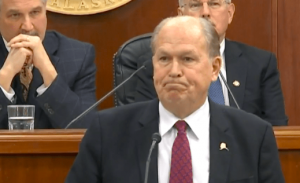NEW FISH TASK FORCES WILL REPORT TO THE GOVERNOR DIRECTLY
Gov. Bill Walker has pulled his secret Cook Inlet fish task force meetings out into the sunshine.
On Monday, he signed an administrative order establishing something called the Governor’s Fisheries Advisory Task Force. Or more correctly – task forces.
The purpose? To be determined.
Although there is no “problem statement” in Administrative Order 295, there also aren’t specific deliverables outlined by the governor.
But there is an overarching purpose: The new task forces may not undermine the role or authority of the Board of Fisheries, which is a constitutionally established governing body, albeit one that is highly controversial because it divvies up a limited and highly coveted resource.
[Read: The exact wording of Administrative Order 295]
Other than that, it’s a rangy order with plenty of leeway.
The task forces are a derivative of the Cook Inlet-oriented meetings the governor has convened with a paid facilitator over the last few weeks. That group has been meeting in Anchorage, without any official status or public notice. It’s an invitation-only arrangement. The group meets again this Thursday in a to-be-determined location. Invited stakeholders are showing up at these meetings at great expense because the fishing season has begun around Cook Inlet, and they can’t be with the fish and be in Anchorage to defend their interests at the same time.

These task forces will be made up of “varied interests, working in innovative and cooperative ways over a finite period of time, will provide observations and recommendations to the Governor on specific assigned fishery issues, which can also serve to assist the Board of Fisheries in the execution of their responsibilities.”
The task forces, according to the order, will get administrative support from the Department of Fish and Game and will work on tasks given by the governor himself.
And the task forces may offer him advice. Walker’s administrative order says there may be any number of these task forces active at a time, whenever and wherever the governor decides one is needed.
“Task forces will be activated via letter or memorandum from the Governor to the Director of Boards and Commissions and the Commissioner of the Department of Fish and Game, which will include the following:
-
- statement of objective(s);
- the composition and size of the task force;
- the time period to accomplish objective(s); and
- specific deliverables (as required).
Task force seats will not be specifically assigned but will represent commercial, sport, personal use, subsistence, enforcement, science, and conservation interests. There is no seat designated for fishing guides, outfitters, or fishing businesses that rely on tourism.
Nongovernmental members will be paid per diem and travel expenses for meetings, but the governor directed that meetings should be held telephonically or by video conference to the extent practical.
Alaska already has 84 local advisory committees that inform the board of fisheries process. Advisory committees, according to the State Department of Fish and Game, are intended to provide a local forum on fish and wildlife issues, and “are critical policy bodies to the boards.”
More than 700 Alaskans already serve on these boards, which also provide ground-truth input to the Alaska Board of Game.
The governor has not focused on fisheries during his three-and-a-half year tenure, and in his 6,200-word, 22-page State of the State address in January only mentioned it once, saying “We have world-class fisheries and are promoting new opportunities such as kelp and shellfish production. We will continue to prioritize healthy salmon habitats that benefit all users.”
But with an election on the horizon and several fisheries in crisis in Alaska, task forces may be seen as an election strategy that costs little, but repairs some of the damage that has occurred since Walker’s first fateful fisheries move: Appointing Roland Maw to replace Karl Johnstone, a respected retired judge, on the Board of Fisheries.
[Read: Fisheries board nominee indicted for the third time]
Maw is still in court defending his right to take years and years of Permanent Fund dividends in the largest Permanent Fund dividend fraud case in Alaska history.

Looks like a pretty good way to get State travel and per diem for some Walker supporters and campaign workers. It isn’t legal but neither is adultery in some places; that’s why nobody does it.
This is a monumental waste of time and resources that is only designed to help Walker get re elected. Appointments will be stacked to gain favor with the commercial sector. It is an attempt to bypass the AC and Board of Fish process and circumvent the public’s input. It will be unacceptable to many and Walker will regret he started this process.
I’m not a UCI fisherman but I’m pretty sure ADF&G won’t announce an opening for at least two or three weeks. Your insinuation that the comm. permit holders are sacrificing fish to suck on the sweet udder of state monies is incorrect.
Given that you admit to not being an UCI commercial fisher, I can understand your post. But there is a lot of work to do before starting to fish. It takes several weeks to get it all together. Walkers call for his secret meeting was during the period that not only PU, Sports and guided sports are gearing up, but so is the commercial fleet. . It was bad timing and a bad idea. Nothing good can come from this politically motivated process.
Heard that Gov Walker just now canceled the next two Task Force meetings scheduled for tomorrow and in a couple weeks. They are put off until the “fall”. Did he have an ehpipany or what? Maybe came to his senses? Even many from the commercial fishing organizations think that his task force idea is a political stunt.
Comments are closed.